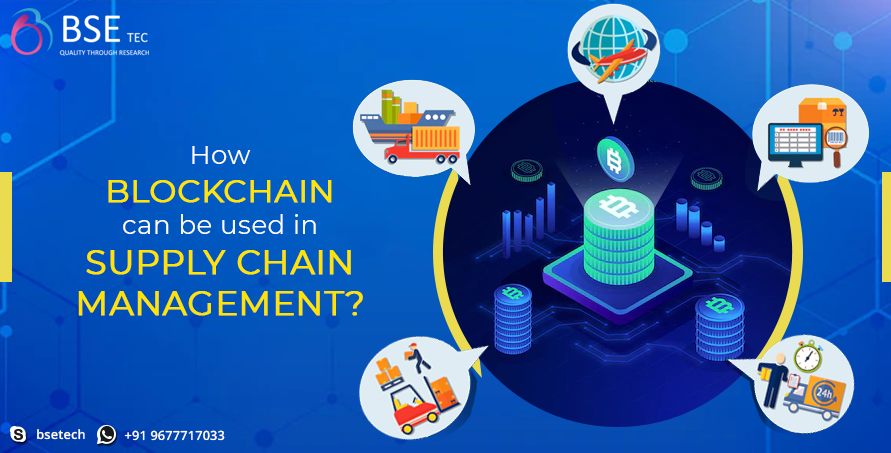How can blockchain be used in supply chain management?

There are several potential uses for blockchain technology within businesses. One of the most complex areas where blockchain could be used is in supply chain management. Blockchain could be used to track the movement of goods throughout the supply chain, from manufacturing through to delivery.
This blog gives insights into how blockchain plays an important role in increasing efficiency and cutting costs in supply chain management.
Supply Chain Management: The handling of a good or service’s entire production flow, from the raw materials to the delivery of the finished product to the customer, is known as supply chain management (SCM).
Goal Of A Supply Chain: Maximizing overall supply chain excess should be the aim of a supply chain. The value created for the client less the total cost incurred during all supply chain stages is known as the supply chain surplus.
Impact Of Supply Chain Decisions On The Success Of A Firm: Because supply chain decisions greatly affect both the revenue generated and the costs incurred, they have a substantial impact on the success or failure of each firm.
Blockchains In Supply Chain Management:
The prime reason why blockchain makes global supply chains more efficient by allowing companies to complete transactions directly and without third parties. Here is a list of the reasons why it is important to integrate blockchains in supply chain management.
Why Blockchain When We Have Other SCM Software?
Decentralized and Immutable
Normal supply chains are centralized and are subject to deceit and counterfeits. Blockchains are trustless, which means it is decentralized, there is no controlling authority and Blockchain technology enables decentralization through the participation of members (suppliers, retailers, and others who are involved in the supply chain system) across a distributed network.
There is no single point of failure and a single user cannot change the record of transactions since every node has a copy of all the transactions.
Private Permissioned Blockchain
A private blockchain is one that only certain users can access and use, and which is often solely used by the entity to which it belongs. A mix of public and private blockchains is known as a “permissioned blockchain”.
For example, Hyperledger Fabric is a permissioned blockchain that allows for the granting of rights and privileges to various users, with which we can add all the involved suppliers and retailers within the blockchain. Secure and Limited Access To make even small changes, it has to go through a consensus mechanism, which prevents committing fraud or counterfeiting by the individuals involved.
Resolve Multi-Party Disputes
Both stakeholders in the supply chain must invest a lot of time and effort into resolving a conflict when it arises.
A statistic shows that, majority of large corporations maintain disputes totaling, on average, USD 200 million. The transparency of blockchain enables us to solve disputes much sooner.
End To End Visibility
Access to real-time information on the order process, inventory, delivery, and potential supply chain disruptions is known as supply chain visibility.
Blockchain can assist in using blockchain to enable traceability and ensure authenticity while securely extending shared, real-time insight to supply chain trading partners, suppliers, and customers.
Reduces the Cost of Procurement Discounts
Because the business logic can be programmed (through smart contracts) to perform the same tasks for a much lower cost than involving auditors and others, blockchains eliminate the unnecessary third parties.
As a result, by implementing blockchain technology, your company has the potential to produce considerable cost savings in the areas of price-verification procedures and procurement discounts. A statistic says, “Car manufacturers are expected to reduce their costs by 10 percent or more as a result of improved supply chain transparency.
Challenges Faced By Supply Chain Management
Supply chain disruptions lead to increased expenses and, more importantly, revenue loss. These disruptions are even worse by ineffective practices that rely on unreliable or timely information.
Conclusion
Supply chain data is not always visible, available, or trusted. However blockchain helps supply chain partners to share trusted data through permissioned blockchain solutions. Partner with the best blockchain development company to integrate blockchain into your Supply Chain management and logistics services. Contact BSEtec for more details.
Did you find this article useful? Let us know by leaving a comment below, or join us on Twitter and Facebook.




